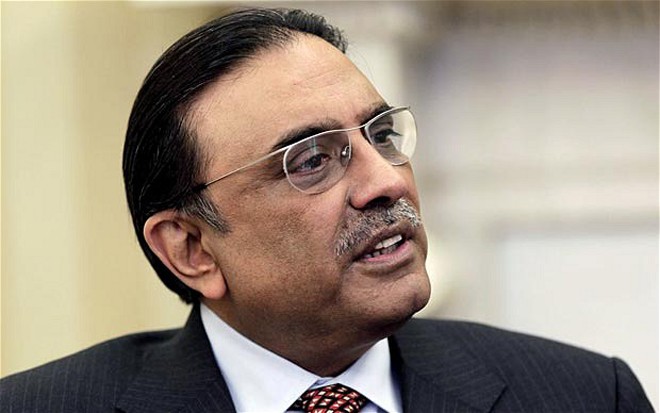
Has Zardari’s outburst against the establishment alienated him from politics in the country?

So far, at least, Asif Ali Zardari’s angry outburst against the military leadership on June 16 has not helped him earn the status of the warrior.
Some analysts are of the view that the co-chairperson of the Pakistan Peoples’ Party, thought to be the master of reconciliations, did not consult his party’s central leadership before using a bitter and angry tone against the military establishment.
This, they think, is apparent from the fact that no party leader of any significance has endorsed his speech.
Instead, Qamar Zaman Kaira, the party’s spokesperson clarified that his speech was about former dictators and the party had the greatest regard for the current military leadership. The media also reported on June 17 that the Central Working Committee had termed Asif Ali Zardari’s statements as his personal opinion.
The Sindh government also took no time after Zardari’s speech to approve the army’s pending request since 2001 for 9,000 acres of forestland for the families of martyred soldiers.
So, what compelled Zardari to take a jab at the army? Political analysts believe that Zardari was pushed into a situation where he had no option but to react strongly.
"Zardari’s outburst was a thunder in vacuum," says Naseer Memon, Islamabad based activist and political analyst who originally belongs to Sindh.
Karachi-based journalist Ali Arqam, who has been closely following the developments in the city, says, "The Rangers have already become a political stakeholder in the city. The business community and traders in the city are happy that at least they have had ‘one-window opportunity’ now in the shape of Rangers. The law and order situation has also improved."
Arqam does not see zeal among the PPP workers to support their current leadership. "I do not think the PPP or for that matter the MQM is in a position to challenge the Rangers in Karachi."
Sources in the PPP say that a couple of days back the party officially contacted the Rangers for reconciliation, where the Rangers asked the party to surrender a few people and get a fresh start.
Also, the PPP insiders agree that the Rangers are actually running the government in Sindh, and that today the military establishment is more in control than it was in 2008, when Musharraf handed over power to a civilian government.
"The PPP may gain political benefits from this episode, as it has always flourished in tough times," says Khalid Qayyum, a Lahore-based senior journalist.
Ejaz Haider, senior political analyst and expert on civil-military relations wrote in his article Military Primacy 2.0 last week that "it was obvious the desirable goal of effective civilian control remains as elusive as it was in 2007… Equally, the military has become much smarter in retaining its position at the head of the high table. I’d call it the transition from the physical use of the 111 Brigade to the control of electronic and virtual spaces. Of course, the physical threat is there. It remains potent. But its effectiveness is not in its use but in the threat of its use."
Handing over the relief work for heatstroke victims to the army and Rangers in Karachi speaks volumes about how serious the issue of governance and service delivery is in Sindh. While military has always been there to showcase it as an institution that cares about the people of Pakistan, the civilian governments -- federal and provincial -- blame each other for the situation.
Read also: Context to the chaos in Karachi
"It is true that the Rangers have become a stakeholder in the city," says Taj Haider, general secretary of Sindh chapter of PPP. "We have always been saying that as terrorism and democracy cannot work side by side, the establishment’s interference will not strengthen democracy".
Haider says the PPP draws its strength from the masses so it cannot go against them while the PML-N draws strength from the establishment and cannot go against it. "It’s all about who you represent. The PPP will again help the PML-N if there is a threat to democracy. A decades-old narrative has been built against the PPP."
Haider further adds that Sindh has achieved almost all the targets, "despite the fact that the federal government has not been giving our share from the shared pool. We try to decrease sales tax every year while the PML-N decreases income tax every year. This shows the priorities of the two parties."
But experts on the political situation of interior Sindh, the last stronghold of PPP after losing support in Punjab, Khyber Pakhtunkhwa and Gilgit Baltistan say that the current leadership of the party does not enjoy the peoples’ support.
"PPP’s rank and file will not support Zardari’s confrontational attitude. Cronies of the current leadership -- Zardari and his sister Faryal Talpur -- are running the party and the government in the province. They are the beneficiaries while the diehard workers are waiting on the backbenches," says Naseer Memon, reiterating that Zardari has no connectivity with the people.
In the midst of this crisis in the party, all of a sudden both Zardari, who has a visit to Punjab and KP scheduled, and chairman Bilawal Bhutto Zardari left the country. Faryal Talpur has also gone to Dubai. But "this may be a blessing in disguise. The party may get rid of Asif Zardari and Faryal Talpur," a senior leader of the party tells TNS on condition of anonymity. "Bilawal Bhutto has given us some signals in this regard. He remained a silent observer in all party meetings during his last visit and directed us ‘to wait for a few days’ in private conversations".